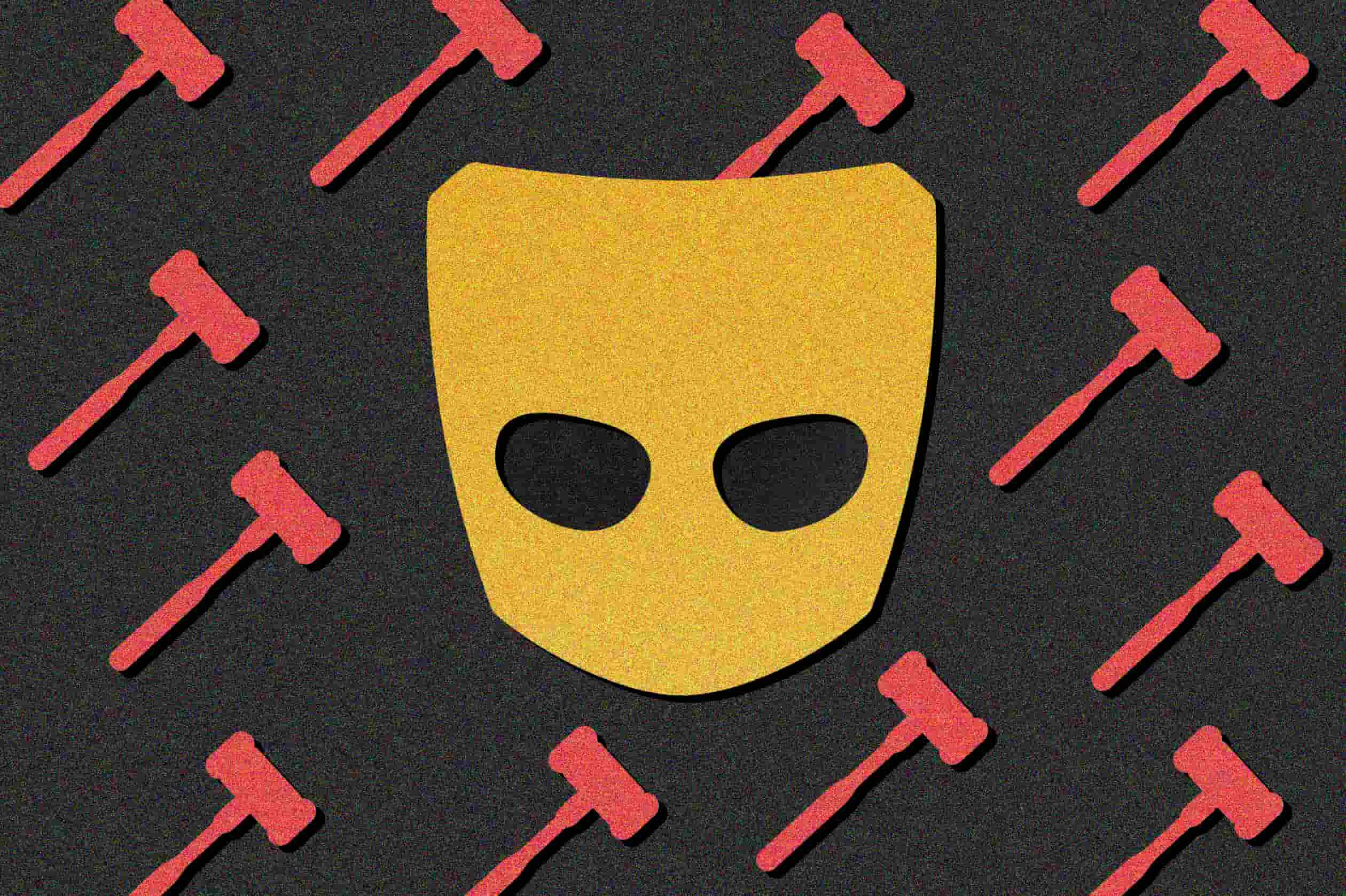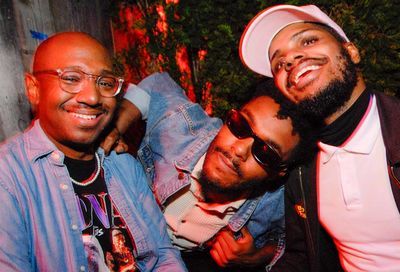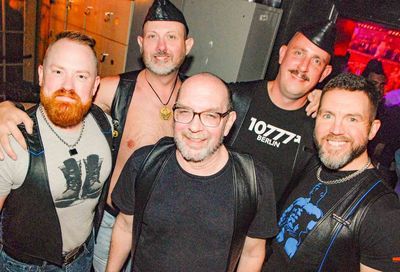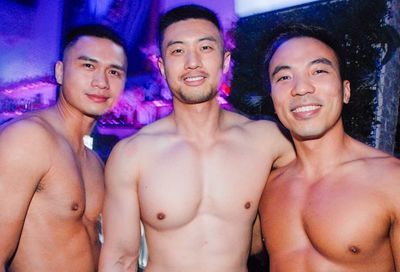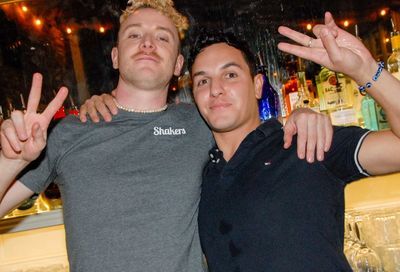Queer as Russell
With "Cucumber" and "Banana," the man who gave us "Queer as Folk" and rebooted "Doctor Who" explores the nature of love, loss, obsession and gay sex.

Russell T. Davies hears us. He genuinely listens.
“People open up to me and tell me their stories,” says the British television writer and producer. “Everyone is always walking around talking about their stories, desperate to be heard. Most of the time we shut them up. If I have a gift, it’s in not shutting people up.”
Good thing, too. Without his “gift,” the shows he creates — particularly the stunning, revolutionary British series Queer as Folk and his latest entry to the queer cultural canon, Cucumber and its companion, Banana — likely wouldn’t exist. A shrewd, clever storyteller, Davies knows precisely how to concoct an alternate universe. And he knows that for those alternate universes to hold our attention, they have to straddle both fantasy and reality, containing enough veracity to allow us to recognize versions of ourselves — sometimes uncomfortably — in the characters he brings to life. And it all comes from years of listening to gay men tell him their stories.
In Britain, Davies is a household name, and has had a long, storied career. Here, in America, he’s known mostly to Doctor Who fans. Despite his legacy connection to Queer as Folk, he’s about to get a lot better known with the arrival of Cucumber and Banana, premiering Monday, April 13, at 10 p.m. on Logo.
The dramas work in tandem with one another in a narratively bold manner. The hour-long Cucumber is the story of Henry (Vincent Franklin) a middle-aged, mild-mannered gay man whose life is upended when a disastrous attempt at a three-way drives a relationship-ending wedge between him and his partner of nine years, Lance (Cyril Nri). Other issues quickly arise. Henry becomes obsessed with Freddie (Freddie Fox) a sexually charged, defiantly confident 24-year-old with whom he shares a flat. And Henry’s big, secret shame is that he’s a gay man who is “still a virgin.” He’s never had anal sex, from either position, and has made avoiding even the prospect of penetration a veritable art form. It’s a vital thread that runs through the 8-part series, propelling it forward.
Cucumber is compelling, magnificent television, yet it still cleaves to narrative conventions (until episode 6, that is, when Davies pulls out the stops in a stunning about-face of tone and style). The half-hour Banana, however, is downright brilliant and groundbreaking in the way it takes characters merely glimpsed in the main series and wraps entire, stand-alone stories around them — stories that have density, complexity and cover everything from being unceremoniously dumped by last night’s trick to being humiliated by a bitter ex on social media. It’s like watching eight short films that have an underlying connection and yet stand entirely on their own. Taken as a whole, Cucumber and Banana comprise some of the best queer television we’ve seen since… well, the original Queer as Folk.

METRO WEEKLY: Let’s begin with your early years.
RUSSELL T. DAVIES: I was born in Swansea, which is in South Wales, many years ago — despite looking 21, as I still do. I went to Oxford University, and from there started working in television. I had my first job in television when I was 21 years old. And I’ve never looked back since.
MW: When did you first realize you were gay?
DAVIES: From about the age of 11. I always knew — there was nothing else in my head. There was no other option available. There was no doubt, no confusion. It was always about the fellows.
My family were absolutely fine with it — I came out in my 20s, completely normally. No one shouted. No one cried. I was very, very lucky in that sense. And there was no one crushing thing that made me come out. There was no man, no crisis, no discovery. It’s just growing up and slowly, eventually realizing that it’s time. And knowing also that it was quite safe to do so, as well. I would urge anyone to come out, but you’ve still got test it out and make sure you’re going to be safe.
MW: The first I became aware of you was with the British version of Queer as Folk, which they showed in full at Reel Affirmations, our gay and lesbian film festival. I remember watching it in one sitting. With regard to gay characters, I’d never seen anything like it. It was just ungodly good. Clearly it was pivotal for you.
DAVIES: It was, yes, very much. It was made for a channel here called Channel 4, which is designed to broadcast things like that. It’s meant to be bold and radical and cutting edge. Up until that, I’d had a very successful career, but one of fitting into other people’s strictures, other people’s shows, other people’s patterns. That was really the first time I was allowed out on my own. It really was a chance for me to let rip. The channel wanted me to write things like that, to be honest about life, to say the things I’d always wanted to say. So it was a great opportunity. Frankly, the doors that opened for me with Queer as Folk have stayed open ever since. So I’m enormously grateful to it.

MW: We hadn’t seen that level of gay interpersonal relationships on television up to that point, certainly not in that kind of detail or specificity. Were you pulling from personal experience?
DAVIES: It’s partly pulling from personal experience and the imagination. People think I’ve lived through everything I’ve ever written, but there’s a very fine saying that goes, “A moment’s imagination is worth a lifetime’s experience.”
But part of it came from anger at what we were having to watch. In Britain, we have such a thing as evening soap opera. I know you have soap operas in the states, but they’re very, very different things to British soap operas. Ours go out in the evening, in prime time, and they’re the highest-rated shows on television, apart from Doctor Who, of course. They’re not about evil twins and kidnaps. British soaps are about working class, birth, marriage, death, romance, heartbreak, sadness, happiness — everyday life in all its glory.
So the soaps had started a good 15 years before Queer as Folk putting gay characters on screen. They were the outliers, they were the forerunners. They made mistakes, and they also did very brilliant things. But they were having to fit into the overall television network shape of things. And so, it was quite shocking and controversial. Just a male character standing up at a pub saying “I’m gay” caused headlines. They did that on a big BBC soap opera and there were headlines the next day saying that the BBC should be taken off the air. That was the mid-80s.
By 1999, I was like, “I’ve had 15 years of that. Enough!” Because while I do appreciate the early work that was done, I didn’t think we had gay men or women in any complexity. There was no darkness to be found. There was no passion. There was no sexuality. There was no side to these people. They didn’t generate any sort of interest. I was angered by the stuff that was failing to be done. And that was a great fuel when I wrote Queer as Folk. I wanted to correct a lot of the rubbish.
MW: Doctor Who is such a treasured show in your country. Was it a weight on you to take it on for a reboot?
DAVIES: I suppose it was a big weight. If it had failed, I would have destroyed one of the things I truly loved in my life — and I’m literally a fan since childhood. I can remember episodes from when I was three years old. It’s one of my very earliest memories. So I loved it. And although I was worried if I had got it wrong, I would have damaged its chances of surviving in the 21st century, I kind of knew how to do it. I was the greatest focus group in history because I’d had 40 years of watching it. I knew exactly what to do with it. And I knew exactly how to make it work. Obviously it could have gone wrong, but I was actually quite confident about how good it could be, because it was all that good in my head, to be honest.
It’s hard to describe Doctor Who to people outside Britain. It’s truly a cultural monolith. By the time we got the show working properly, right about 2008, we were getting viewing figures that you would find at the Super Bowl. You won’t find an American drama getting equivalent ratings of what we were getting for Doctor Who. It’s truly, truly monolithic in this culture. It has vast impact. I don’t think you can bump into anyone in the street of any age, any background in Great Britain who does not know what Doctor Who is. It’s literally soaked into Britain.
And here we are. It’s just celebrated last weekend with its tenth anniversary — ten years, still number one in the ratings. And it’s a science fiction show with lasers and monsters and spaceships and chases and jokes. For that to be number one for so long is a miracle. So hooray. We live in a Doctor Who world now.

MW: Do you have a favorite doctor?
DAVIES: [Laughs.] I can’t answer that question, it’s not fair. I’ve worked with these men, I couldn’t possibly single one of them out. When I was young, it was Tom Baker who was Doctor Who in the late ’70s and early ’80s. As a childhood favorite, there’s that.
MW: With the spinoff, Torchwood, you brought gay content to the fore. You represented us by including us. Which seems to be your modus operandi — find a way to include us in all stories.
DAVIES: People give me a lot of credit for doing that — and they thank me for doing that — but to be honest, it’s kind of automatic. No one would ever question a straight person putting straight people into their shows. I’m gay. If you’re hiring me, that’s what you’re gonna get. It’s literally that automatic. I have yet to meet an executive who would dare to ask me to remove a gay character from a script. And honestly, I’m not even sure that executive exists. If they do, they’re not working with me, they wouldn’t want to work with me, they wouldn’t even approach my agent in the first place, because that’s what you’re going to get with me. I am very happy within my own world and feel I can push at the edges a bit. Certainly, in Britain anyway, these mysterious homophobic executive producers tend not to exist. Of course they don’t. They work in television, for god’s sake. They’re not priests.
MW: So you’ve never had an encounter where an executive has said, “That may be too far, tone that down.”
DAVIES: No. Absolutely never. And that’s also because I work very responsibly. I don’t put things in scripts that are just there to shock. I absolutely, genuinely work hard and diligently. And everything is up for debate. Other people pay you, they’re going to ask me why stuff is in there, and I will genuinely have a defense. My response is never to say that a scene is there to shock or to be provocative or just to be silly. I’ve always, always, always got 27 reasons for whatever I’ve written. People like that. That’s why they give me the money. I’m a hard worker and diligent worker and an imaginative worker. I earned my place there, I think. I sleep at night.
MW: Let’s talk about the new series. My approach was to watch one episode of Cucumber and then Banana. Is that how you intended them to be viewed?
DAVIES: It’s designed so you can watch them anyway you want to. It would be a bit odd to watch Cucumber in the wrong order, because that’s one long story. But it’s designed not to be complicated because people’s lives are busy. Life is hectic. There’s no reason why television should complicate it even further.
It’s really simple. Cucumber is a strong, central mothership of a show that’s about the life of Henry. The Banana episodes — you can, if you want, watch them in any order you like. You can just watch only a couple of Bananas if you want. I think each Banana can be hived off into separate little indie films and sent around the world to film festivals. You could just watch them completely isolated. If you do watch them in tandem with Cucumber, you get a slightly richer experience, but it’s very important to say that you don’t lose track of the plots and things won’t not make sense if you don’t watch Banana in order. It’s been very carefully designed so you can just focus on one, you can just focus on the other, you can focus on both, but you’ll always follow what’s going on.
MW: The first Banana enhanced the Cucumber storyline directly, more so than the others, because it illuminated a principal character’s story in a way that deepened our understanding of him. That said, you didn’t need to create a show beyond Cucumber. Why bring Banana into it at all?
DAVIES: Well, the heart of the series, in terms of Cucumber being the mothership, is the life of a middle-aged man. And I was always very aware that for Cucumber to be written well, Cucumber would have to be very focused. It could never involve lesbian stories, or trans stories — these characters could pass through Henry’s life, but the series isn’t about them. That was something people complained about with Queer as Folk. Lesbians were quite marvelously vociferous about saying that they weren’t represented on screen. My reaction to that is it’s not about representation, it’s about a good drama.

Nonetheless, sixteen years later, I was very aware that here I come again with another show that was going to be very, very male-based — and could only be male-based. The series would weaken if I tried to widen its focus. So in this world of digital platforms and multi-channel viewing experiences, I thought there was room to do a spinoff that would get other voices involved. And not in terms of characters, but also in terms of writing staff.
I wrote all of Cucumber, but I only wrote three episodes of Banana. There’s an entirely gay writing staff on Banana with some very strong women’s voices in there, writing stories about young lesbians, about trans characters, about young gay men who are not covered in Cucumber. The point is to get more of the gay experience on screen, to get more than just the monolithic male culture.
I do think that things are still weighted culturally within gay fiction towards the men. And so Banana balances that out. It’s a chance for different voices, different lives, different experiences, different ethnic representations, different sexual representations, different jokes, different dramas. There’s a lovely range of stories across Banana. So put that spinning around Cucumber, which is a very, very strong male experience and I think it’s quite a nice snapshot of 2015.
MW: I found the second Banana to be especially touching.
DAVIES: That director had only ever directed two episodes of broadcast television before. The last two episodes of Banana were directed by a man who never had anything on television before — just a couple of short films online.
I’m 51. At this time of life, you start looking backwards and paying it back. Getting the next generation of writers working, getting the next generation of directors working. I know I’m very lucky to sit in my position and to be paid very nice sums of money to do these things with a lot of freedom, so you kind of have to share that out. You have to look behind you and see who’s coming up next, and give them a helping hand, just as I was given a helping hand by the people before me. It’s a great honor and privilege to do these things.
MW: There’s a third series, Tofu.
DAVIES: You’re not getting that in America and I’m not quite sure why. They’ve got it in Australia, but maybe there’s just not room on the local website or something. Tofu was a series of 10-minute documentaries that followed the transmission of Cucumber and Banana. You get a 10-minute documentary talking about sex, talking about the subjects that were raised in each week’s episodes. It sounds rather boring, but it was a fun show. It had songs, it had some comedy sketches. It also increased the range of the sexualities covered.
The third episode of Tofu is my absolute favorite because it spoke to people not having sex, it spoke to asexuals, it spoke to celibates, and it talked to virgins. And it is a beautiful piece of work because while Cucumber and Banana are literally focused on sex and have a mission to explore sex in all its complexity and detail, to have this spin-off documentary show you a world in which sex wasn’t important to any of these people was a glorious, glorious thing. It’s probably available online, to be honest. Go and have a look. You’ll find it.

MW: It’s like you’re creating a thesis on gay sex with these three shows.
DAVIES: Yeah, it was a triptych as we used to call it. I discovered this when I did Doctor Who. We spun off Doctor Who into Torchwood. We spun off a children’s version of Doctor Who called The Sarah Jane Adventures. We took an old companion of Doctor Who’s called Sarah Jane Smith and did a children’s Goosebumps type series. Much better told than Goosebumps, I must say. Plus there were website spin offs. At one point there were seven different programs, including behind-the-scenes programs. It was mad. But it really taught you a lot in this day and age about building a factory, and sort of weaponizing these shows to get out there and be seen and to be successful. It’s all about visibility now, because it’s a noisy, loud world. It was interesting bringing some of that over into adult drama, looking at Cucumber and saying actually, “How can we maximize this?”
So now, if I was to walk into a television studio with just Cucumber, their first question would be, “What else can we do? What can our digital platforms do? What spinoffs are there? What documentaries are there? What are the DVD extras, can we do commentaries, can we do this, can we do behind the scenes?” It’s kind of automatic. And those spinoff things are usually quite rubbish because they’ve been thought of second. They’re just added, they’re just extra, they’re just kind of flat because they don’t have much inspiration in them. I like Banana and I like Tofu, because they are part of the original inspiration. They bring a lot of energy with them because they’re genuine spin-offs. They’re integral to the whole thing. They’re part of the viewing experience.
MW: Let’s talk a bit about the central character of Henry and his fear of penetrative anal sex, which as a gay man I find –- I don’t want to say it’s implausible but it just seemed kind of odd.
DAVIES: Really? I think you’re completely wrong. Part of the reason you’re finding it implausible is because these men don’t speak up, or they’re not heard. They exist in the absolute thousands, if not millions, worldwide. But certainly within the West, there are thousands and thousands and thousands of men like this. Your reaction simply shows how silent they are.
MW: Well, it’s particularly interesting that Henry and his partner, Lance, have been together nine years and this has not been resolved between them in any kind of capacity. Obviously, you need that as a plot catalyst, the conflict it creates propels the narrative. But you say that there are thousands of men silent on this issue? How do you know this?
DAVIES: I meet them. I keep meeting them time after time after time. I wrote Queer as Folk after 15 years of going out clubbing and meeting that classic couple of two best friends, one who is secretly in love with the other — that Stuart and Vince relationship, which was the entire core of Queer as Folk. I met those men time and time and time again until I thought, “I have to write about these two.”
With Henry and Lance, I keep meeting the couples time and time again who only when drunk or depressed or lonely or when pushed will confess that they don’t have penetrative sex. If you don’t want to have penetration, that’s completely fine, but why is it a secret? Why are you keeping quiet about it? The fact that it’s kept quiet indicates that there’s something wrong — not something wrong with you, but something wrong with the world.
I’m a huge consumer of gay culture, gay artifacts, I read the magazines, go through websites and think “This isn’t being spoken about.” If you look online, if you look in the magazines, if you go on Grindr, we’re all tops or bottoms or vers — it’s all we are. When actually there are a thousand more categories — all the kissing or the blow jobs or the intimacy or the mutual masturbation or whatever you want to indulge yourself in, there’s a million different forms that simply are fitting. And with the advent of technology now, where you have to define yourself in three words online, the definition, rather than becoming broader, is becoming more strict. It is top, bottom, vers. Top, bottom, vers.
MW: How do you define sex then?
DAVIES: Well, I don’t. That’s the point. We’re defining ourselves by who we fuck and how we fuck. Kissing’s fine, the blow job’s fine, whatever. I’m certainly not going to sit here and give a definition because, I think as a writer, I’m here to watch the parade, not lead the parade. It’s a fascinating area.
MW: Do you think apps like Scruff and Grindr, which factor into both shows, are harmful to our sexual socialization?
DAVIES: I don’t know if they’re harmful. I think it’s easy to look for the harm, but you can also look for the joy in them. I met someone yesterday who is actually in a six-month relationship having met on Grindr. So I can’t look him in the eye and say it’s a bad thing.
I think we’re living through a very odd period of history, where we all type with each other. We’re really not designed to type with each other. The written word is a very different thing to speech and contact and human body language. And one day they’ll make period dramas about the year 2015 and audiences will all roll with laughter as we all type to each other. So whether that’s good or bad, I just can’t tell at the moment. I think it’s very strange, but we’ll pass through it. This will look like a very strange little hiccup in history.
MW: Where do you see gay and lesbian stories going in 15 years?
DAVIES: I see them as just getting better and richer and wider. I can see that happening already with Empire in the states, where you’re getting a different base of ethnic characters being out and diverse. We’re starting to see it in genre programs like The Walking Dead. I hold high hopes that Marvel will lead the way and do something with a gay character in a superhero film one day. Fingers crossed. I hold no hope whatsoever of DC doing that because their films are made by idiots. But I think in 15 year’s time, we will be broadcasting stuff written by the next generation of gay men and women, so if it is good, then it will leave me completely mystified. I will be sitting there puzzled, and eager to learn, and confounded by gay characters and an exploration of sexuality that I’ve never seen before, that I would never dream of exploring simply because I’m 50 years older and these 21-year-olds are discovering completely new worlds. So that would be by far the best legacy — to leave me lost and confounded.
Cucumber and Banana premiere Monday, April 13 at 10 p.m. on Logo. Check your local cable listings. Visit Logotv.com.
Support Metro Weekly’s Journalism
These are challenging times for news organizations. And yet it’s crucial we stay active and provide vital resources and information to both our local readers and the world. So won’t you please take a moment and consider supporting Metro Weekly with a membership? For as little as $5 a month, you can help ensure Metro Weekly magazine and MetroWeekly.com remain free, viable resources as we provide the best, most diverse, culturally-resonant LGBTQ coverage in both the D.C. region and around the world. Memberships come with exclusive perks and discounts, your own personal digital delivery of each week’s magazine (and an archive), access to our Member's Lounge when it launches this fall, and exclusive members-only items like Metro Weekly Membership Mugs and Tote Bags! Check out all our membership levels here and please join us today!




